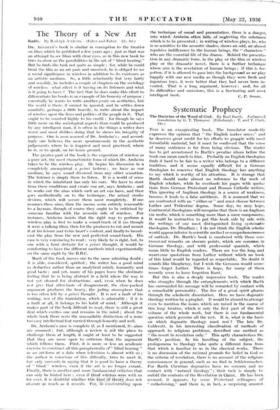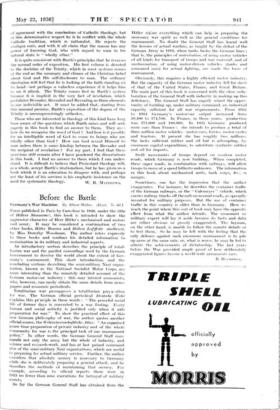Systematic Prophecy
188.) ,
Tins is an exasperating' book. The translator modestly expresses the opinion that " the English makes-sense," and
he deserves great credit' for his effortS to grapple with most formidable material, but it must be confesSed that the' sense' of many sentences is far from being obvious. The reader has to get accustomed to Barth's peculiar idiom before the book can mean much to him: Probablyan English theologian finds it hard to be fair to a writer whb belongs to a different tradition, and it seems equally difficult: for a German theologian to conceive that English theokigy has anything to say which is worthy Of his attention. It is strange that
Barth should make almost no reference' to the work of English scholars, while he overloads his' pages with quota- tions from German Protestant and Roman Catholic writers. This ignoring of Anglican theology is a source of weakness, because it leads to a false antithesis. It is assumed that we are confronted with an " either-or " and Must choose between Luther and Tridentine dogma. Some day, *e may hope, Continental theologians will recognise that there. is an Anglican, via media, which is something more than a mere compromise. It would be instructive to put this book side by side with..
the writings of our most distinguished living: systematic theologian, Dr. Headlam ; I do not think the English scholar would appear inferior in scientific methol or comprehensiveness of outlook. Dr. Barth's book is cumbered with those con- troversial remarks on obscure points, which are common in German theology, and with professorial quarrels, which mean little to. English readers. There are too the long and wearisome quotations from Luther without which no book of this kind would be regarded as respectable. No doubt it sounds like blasphemy, but I wish the Germans would some- times forget Luther. There is hope, for many of them recently seem to have forgotten Rant.
But this is also a deeply impressive book. The reader who struggles through the entanglements with which Barth has surrounded his message will be rewarded by contact with a remarkable personality. The fire of a great spirit gleams through the scholastic dissertation. Here we have dogmatic theology written by a prophet. It would be absurd to attempt even to mention the issues which are raised in the course of this long treatise, which is only the first part of the first volume of the whole work, but there is one fundamental question which governs all the rest. It is, what is the basis on which dogmatic theology must rest ? The late Dr.
Caldecott, in his interesting classification• of methods of approach to religious problems, described one method as " the resort to revelation only." This aptly characterizes Dr.
Barth's position. In his handling of the subject, the prolegomena to theology take quite a different form from that which is familiar to us in the classical works. There is no discussion of the rational grounds for belief in God or the criteria of revelation, .there is no account of the religious consciousness in general, such as we find in Schleiermacher. For Barth Christian dogmatics have no concern and no contact with "natural theology"; their task is simply to unfold the contents of the Revelation in Christ., He has been accused, it appears, by some Protestant colleagues of " catholicising," and, there is in fact-, a surprising amount -
of agreement with the egnieludeits- of theology;- but in this determinative respect he is-4n conflict-With the whole Catholic tradition, Which' is '-rationalist. T He rejects the analogia entis, and with it all claim that the reason has any power of knowing God, who with regard to man in his natural state is "'wholly other."
It is quite consistent with Barth's principles that he reverses the normal order of exposition. His first volume is devoted to the doctrine of the Trinity, which in most systems comes at the end as the summary and climax of the Christian belief about God and His self-disclosure to man. The ordinary theologian will feel that he is looking at the faith standing o:t its head—not perhaps a valueless experience if it helps hint to see it 'afresh: The Trinity conies first in Barth's system because it is implicit in the very fact of revelation, which postulates Revealer, Revealed and Revealing as three elements in one indivisible act. It must be added that, starting from this unusual premise; Berth's exposition of the dogma of the Trinity is uncompromisingly orthodox.
Those who arc interested in theology of this kind have long been aware of the questions which Barth raises and will seek eagerly in this book to find an answer to, them. They are : how do we recognise the word of God ? And how is it possible_ for an intelligible word of God to conic to beings who are wholly other than God ? How can God reveal Himself to man unless there is some kinship between the Revealer and the recipient of revelation ? For my part, I find that these questions still remain after I have pondered the dissertations in this book. I find no answer to them which I can under- stand. It is difficult to believe that Protestant theology will, as a whole, accept Barth's irrationalism, but he has given its a book which it is an education to disagree with, and perhaps not the least of his services is his emphatic insistence on the



















































 Previous page
Previous page